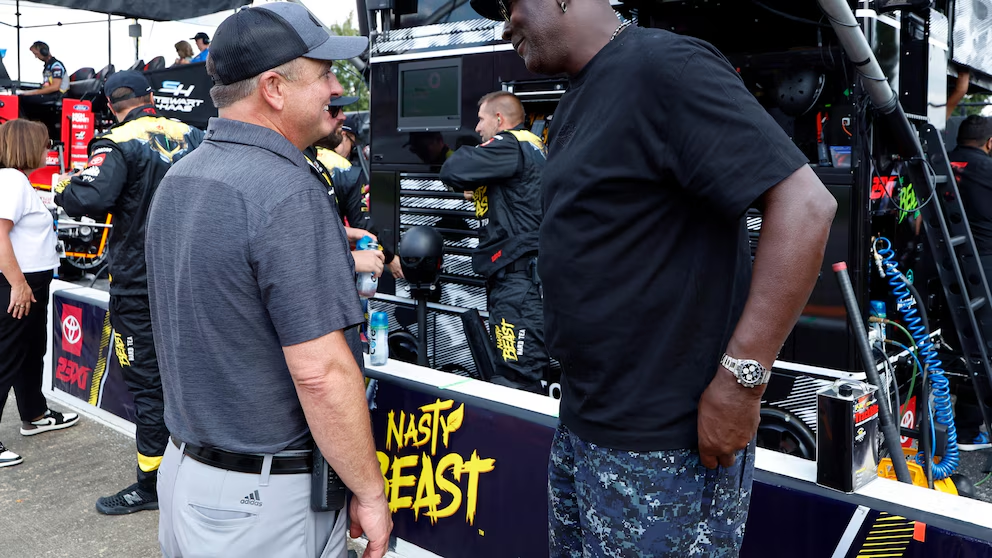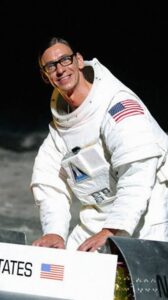
**Breaking News: Michael Jordan and Bob Jenkins Challenge NASCAR with Federal Antitrust Lawsuit**
**TALLADEGA, Ala.** — In a stunning turn of events, NBA legend Michael Jordan and NASCAR team owner Bob Jenkins have filed a federal antitrust lawsuit against NASCAR. The lawsuit is a direct response to NASCAR’s recently implemented charter agreement, which both Jordan and Jenkins have refused to sign. This bold legal move could mark the beginning of a significant shake-up in the world of NASCAR, with the potential to alter the dynamics of team ownership, competition, and revenue-sharing within the sport.
### Background of the Charter Agreement Dispute
NASCAR’s charter system, introduced in 2016, was designed to create stability for team owners by ensuring a fixed number of guaranteed spots for chartered teams in each race. Under this model, charter holders have more predictable income streams, access to revenue sharing, and enhanced value in their team assets. The goal was to give teams a sense of security, foster investment, and create a more competitive environment. However, the charter system has been under scrutiny since its inception, with critics arguing that it allows NASCAR to exert too much control over team operations and ownership dynamics.
This year, NASCAR updated the charter agreement and sought signatures from all participating teams. Yet, Jordan’s 23XI Racing and Jenkins’ Front Row Motorsports were the only two of NASCAR’s 13 teams to decline to sign the new terms. The deadline passed with both teams holding out, citing concerns over the charter’s revenue-sharing model, which they believe disproportionately benefits larger, wealthier teams. Many within the industry see the new lawsuit as a challenge to what the plaintiffs view as monopolistic practices by NASCAR.
In a statement to Fox Sports, Jordan expressed his frustration with the system, saying, “I think everybody should have an opportunity to be successful in any business, and my voice is saying it hasn’t been happening.” His comments reflect growing concerns within NASCAR that small and mid-sized teams are struggling to compete financially and are becoming marginalized.
### The Legal Implications
The lawsuit, filed in federal court, accuses NASCAR of violating antitrust laws by monopolizing team revenue distribution and the sport’s broader competitive landscape. Jordan and Jenkins allege that NASCAR’s new agreement stifles competition, restricts independent team growth, and effectively forces team owners into unfavorable business arrangements. This lawsuit could open the door for judicial scrutiny of NASCAR’s practices, possibly setting a precedent for similar cases in other sports industries.
Legal analysts have noted that antitrust cases in sports are notoriously difficult to win. However, if the court finds merit in the arguments made by Jordan and Jenkins, it could trigger broader investigations into NASCAR’s operations. A favorable ruling for the plaintiffs might compel NASCAR to restructure its revenue-sharing model, giving smaller teams a more equitable slice of the pie. Such a ruling could also set a new legal precedent, impacting how professional sports leagues manage their internal agreements and revenue-sharing mechanisms.
### Michael Jordan’s Investment in NASCAR
Jordan, who joined NASCAR in 2020 as the majority owner of 23XI Racing alongside driver Denny Hamlin, is one of only two Black team owners in the sport. His investment was seen as a significant boost to NASCAR’s efforts to attract a more diverse fan base and bring increased visibility to issues of social justice. The team, which fields drivers Bubba Wallace and Tyler Reddick, has a diverse staff and management team, contributing to a broader push for inclusivity within the traditionally homogenous sport.
Since 23XI Racing’s debut, the team has made a significant impact on the NASCAR landscape, both on and off the track. Wallace, who drives the No. 23 car, has been vocal on social issues, advocating for racial equality and being instrumental in NASCAR’s decision to ban the Confederate flag from its events. Reddick, the team’s newest driver, has bolstered the team’s competitive profile with his performance on the track.
Jordan’s involvement in the lawsuit is seen as a powerful statement, not only because of his fame and wealth but also due to his commitment to advocating for fairness and equality. NASCAR’s handling of this lawsuit could have repercussions on how the sport is perceived by a broader audience, particularly as it strives to expand its reach among more diverse demographics.
### Bob Jenkins and the Front Row Motorsports Stand
Bob Jenkins, owner of Front Row Motorsports, has been a dedicated figure in NASCAR since 2005. Jenkins’ journey in the sport has been marked by his tenacity and passion for racing, often running his team on a limited budget compared to powerhouse organizations like Hendrick Motorsports and Joe Gibbs Racing. Despite these challenges, Front Row Motorsports has earned respect throughout the NASCAR community for its perseverance and determination.
Jenkins’ involvement in the lawsuit reflects his frustration with the charter system’s financial structure. Unlike larger teams that have sponsorships and resources, Front Row Motorsports has historically operated with fewer resources. Jenkins’ investment into the team, funded primarily through his own wealth, has highlighted a systemic issue where smaller teams are forced to spend disproportionately more to remain competitive.
Michael McDowell, who has driven for Front Row Motorsports since 2018, expressed his support for Jenkins, stating, “Bob Jenkins is so dedicated to this sport. He has spent millions and millions of his own dollars to be in this sport and to be competitive. Nobody does that unless they’re insane or super passionate.”
McDowell’s comments emphasize the high stakes for smaller teams, which often struggle to compete financially with their larger counterparts. Jenkins and Jordan’s lawsuit underscores the need for a more balanced revenue model that would allow teams like Front Row Motorsports to compete on more equal terms.
### NASCAR’s Response and the Road Ahead
So far, NASCAR has declined to comment on the lawsuit, and Chairman Jim France has avoided public statements on the matter. However, the lawsuit has created an atmosphere of uncertainty within the NASCAR community. Team owners and fans alike are eagerly awaiting NASCAR’s legal response, which could come as early as this week, just ahead of the playoff elimination race at Charlotte Motor Speedway.
Many team owners are watching closely, concerned about how the lawsuit might affect them if it succeeds. Richard Childress, owner of Richard Childress Racing, voiced concerns about the terms of the charter agreement he signed, stating that he’s unsure if all teams received the same terms or if larger organizations were offered more favorable deals.
“There’s no historical precedent,” said Justin Marks, owner of Trackhouse Racing. “I think in other cases like this, in other sports, you have collective bargaining unions. So it’s just a very, very different setting. I think we have a blank slate and we can land anywhere. I think whatever comes out of this, I have to believe that it should affect everybody the same.”
### Potential Impact on NASCAR’s Future
The outcome of this lawsuit could have far-reaching implications for NASCAR and its future as a competitive sport. If Jordan and Jenkins prevail, it could lead to a new era of fairness and equality in NASCAR’s revenue-sharing model, enabling smaller teams to compete more effectively. A favorable verdict could also push NASCAR to re-evaluate its operational and financial policies, potentially leading to a more open and transparent business environment.
The lawsuit has also sparked conversations around the potential need for a union or collective bargaining agreement in NASCAR, similar to those seen in other major sports leagues like the NFL and NBA. Such a move would represent a major shift for NASCAR, which has traditionally operated without a formalized structure for driver and team-owner rights.
As the NASCAR community braces for what could be one of the most pivotal legal battles in its history, fans and stakeholders alike are left to ponder the future of a sport that has long been defined by tradition and loyalty. Whatever the outcome, the lawsuit filed by Michael Jordan and Bob Jenkins will undoubtedly leave a lasting mark on NASCAR and could set the stage for a new chapter in the sport’s evolution.




